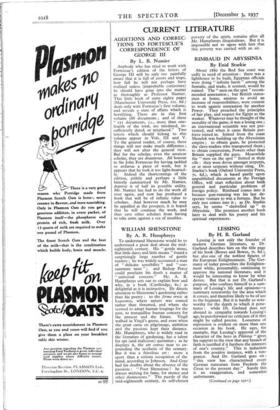WILLIAM SHENSTONE By A. R. Humphreys
To understand Shenstone would be to understand a great deal about the mid- eighteenth century. His " gentle muse, that little dares and little means " found a surprisingly large number of gentle readers • he was widely accounted a man of " delicate sensibility " and " con- summate taste " • and Bishop Percy could proclaim his death a matter of " universal concern." Mr. A. R. Humphreys sets out to explain -how and why, in a book (Cambridge, 6s.) as delightful as it is instructive.' He directs attention to Shenstone's gardening rather than his poetry : to the ferme ornee at Leasowes, where nature was coaxed rather than thwarted, and where she seemed to adopt human longings for the past, to tranquillise human concern for the present and the future. Virgil walked in Virgil's grove, and even when the great came on pilgrimage, ambition and the passions kept their distance. Mr. Humphreys, who is widely read in the literature of gardening, has a talent for apt (and malicious) quotation ; as he displays it, the art comes near to ex- pounding the aesthetic of the century. But it was a frivolous art : more a sport than a serious occupation of the mind, according to Johnson. And Gray had his doubts about the absence of the passions : " Poor Shenstone ! he was always wishing for fame, for money and other distinctions." The puzzle of the mid-eighteenth century, its self-chosen
poverty of the spirit, remains after all Mr. Humphreys disquisitions. But it is impossible not to agree with him that this poverty was carried with an air.


























































 Previous page
Previous page